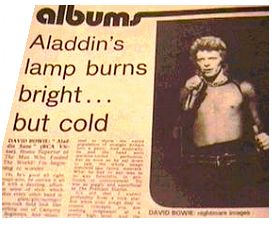 Companion
Companion![]() The
The  Companion
Companion
Home ¦ Index ¦ FAQ ¦ Encyclopaedia ¦ Timeline ¦ Songs ¦ Gallery ¦ E-mail
| Reviews | ||

by A.L. - Melody Maker (19 April 1973)
DAVID BOWIE: "Aladdin Sane" (RCA Victor). Homo superior or The Man Who Fooled The World? I'm beginning to wonder.
Oh, he's good all right. Image-wise, he carries it all off with a dazzling, effortless sense of style which makes every-other band in the glam/glitter/outrage/theatre-rock field look like something out of a Camping For Beginners. And musically, he and Mick Ronson and Mick Woodmansey and Trevor Bolder and the rest are light-years ahead in their cruel precision.
But how deep does it go? Is David Bowie really saying anything much at all? As Ziggy Stardust, rock and roller, he gets it on, no doubt about it. But judged against the standards of the astral image which he and his followers have nurtured - the whole Starman, Stranger In A Strange Land aura - his achievements have been disappointing.
This was brought home forcibly the other week by Bowie's appearance on the Russell Harty TV show. While he was singing he was perfect: the whole scintillating bisexual image, guaranteed to throw the entire population of straight Britain into panic. And musically, he and the band were machine-tooled perfection. But as soon as he sat down to talk, the whole image dissolved like runny mascara. What he had to say was in no way futuristic, or profound, or controversial. He was as The Prettiest Starlet.
It's not that I expect profundity from a rock star. But when your songs deal in cosmic concepts you are inviting judgement at a pretty high level. And the sad truth is that five minutes of a film like 2001 or one chapter of Asimov or Clarke says more about what Man can or will become than the entire body of Bowie's "futuristic" songs.
It's the same story with this latest album, which is superficially stunning and ultimately frustrating. The title is a pun, of course, and a deadly accurate one: the lyrics are more intense, more strung-out, more fragmented than anything he's done before: splintered nightmare images of a journey across America. At times the lyrics reach that level of obscurity which it is fashionable to describe as "oblique" but which sound to me merely confused and hastily thrown together.
Musically, the songs are executed with a brutal panache which puts this album closer to satanic "The Man Who Sold The World" than "Hunky Dory" or "Ziggy Stardust." Melodically the songs have Bowie's usual flair - "The Jean Genie" and "Drive-In Saturday" have already proved themselves as singles and most of the others here are just as catchy, especially "The Prettiest Star," a very poppy reworking of an old song from "Space Odyssey" days. "Watch That Man" and "Panic In Detroit" are stormers with a strong Rolling Stones feel - although Bowie's version of "Let's Spend The Night Together" is very un-Stonesy, precise and asexual. "Cracked Actor" is probably the most successful cut: a vividly powerful tale of Hollywood, heroin and sexual cruelty. But the two key works here, I suppose, are the title track and "Time." Both have a strained alienated feel, heightened by the fractured jagged piano of new man Mike Garson, but the lyrics promise far more than they actually deliver - which is the way I feel about the whole album.
There is much to dazzle the eye and ear, but little to move the mind or heart. It is clever, but icy cold, and I have a feeling that the songs here will not be long remembered.
But maybe that's the way Mr Bowie wants it, as he makes his plans to go into movies and talks about farewell tours. Perhaps, as his spirit Andy Warhol once said, everybody should be famous for just 15 minutes.
---This page last modified: 13 Dec 2018---